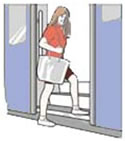 Doors and gates, whether automated or manual, can pose a serious hazard to users if not designed, manufactured, installed and maintained properly. The different types include automatic doors, overhead garage doors, elevator doors, sliding doors, swinging doors, and automatic gates. Door injuries are typically associated with an impact between the door or gate and a user. To reduce such injuries, standards have been developed to limit the speed and energy associated with a closing door or a gust of wind blowing a door open. Additional safety requirements exist for automatic doors, gates and door closers. Testing can determine whether a door meets applicable standards.
Doors and gates, whether automated or manual, can pose a serious hazard to users if not designed, manufactured, installed and maintained properly. The different types include automatic doors, overhead garage doors, elevator doors, sliding doors, swinging doors, and automatic gates. Door injuries are typically associated with an impact between the door or gate and a user. To reduce such injuries, standards have been developed to limit the speed and energy associated with a closing door or a gust of wind blowing a door open. Additional safety requirements exist for automatic doors, gates and door closers. Testing can determine whether a door meets applicable standards.
Expertise
We have extensive experience in many aspects of door accidents including:
- Proper door closer operation including sweep and closing speeds
- Presence and motion sensors which control door opening and closing
- Door and gate standards
- Testing: force, speed & energy measurements
Questions Answered
Through scientific analysis, we can help you answer pertinent questions such as:
- Did the elevator door close with too much energy?
- Should the closer have prevented the wind from blowing the door closed?
- Did the door satisfy the appropriate standard?
- Could the injury have been caused by a faulty sensor for the closing gate?
Case Examples
Windblown Glass Door Shatter:
An improper closer on a store's glass front door permitted the wind to blow the door open rapidly. The subsequent impact with a nearby structural element shattered the plate glass and caused a long piercing cut on a customer's arm. Our analyses of the door closer and wind forces convinced the jury that the door closer was deficient and the customer was awarded a large cash settlement.
Elevator Door Closing:
A woman claimed to have been injured by a closing elevator door at her apartment complex. An inspection of the door determined that its closing speed and closing force complied with the applicable elevator standard requirements. Our biomechanical analysis showed that the forces imparted by the door during the alleged impact would not have been severe enough to cause the claimed injuries.
Kristopher J. Seluga, PE, is a Mechanical Engineering, Accident Reconstruction, Biomechanics, and Safety Expert with over 20 years of experience. He received his Bachelor's and Master's degrees from the Mechanical Engineering department at MIT where he worked on the development of novel three-dimensional printing technologies. Mr. Seluga is also a licensed Professional Engineer in New York and Connecticut, and has served as a member of the ANSI engineering committee for the Z130.1 and Z135 standards for golf cars and PTV's. His research interests and peer reviewed publications span the topics of Motor Vehicle Dynamics, Product Safety, and Biomechanics.
©Copyright - All Rights Reserved
DO NOT REPRODUCE WITHOUT WRITTEN PERMISSION BY AUTHOR.



 Doors and gates, whether automated or manual, can pose a serious hazard to users if not designed, manufactured, installed and maintained properly. The different types include automatic doors, overhead garage doors, elevator doors, sliding doors, swinging doors, and automatic gates. Door injuries are typically associated with an impact between the door or gate and a user. To reduce such injuries, standards have been developed to limit the speed and energy associated with a closing door or a gust of wind blowing a door open. Additional safety requirements exist for automatic doors, gates and door closers. Testing can determine whether a door meets applicable standards.
Doors and gates, whether automated or manual, can pose a serious hazard to users if not designed, manufactured, installed and maintained properly. The different types include automatic doors, overhead garage doors, elevator doors, sliding doors, swinging doors, and automatic gates. Door injuries are typically associated with an impact between the door or gate and a user. To reduce such injuries, standards have been developed to limit the speed and energy associated with a closing door or a gust of wind blowing a door open. Additional safety requirements exist for automatic doors, gates and door closers. Testing can determine whether a door meets applicable standards.






